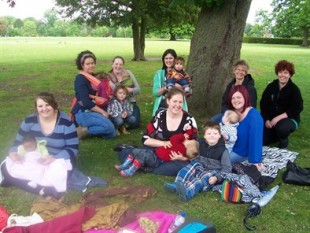 The six high impact areas articulate the contribution of health visitors to the 0-5 agenda and describe areas where health visitors have a significant impact on health and wellbeing and improving outcomes for children, families and communities. One of these areas is breastfeeding, which health visitors in Cheshire East, along with other public health agencies, are targeting in a peer support group that does more than simply provide a place to chat. There is also a four-level service model which varies based on need from universal to targeted services. The blog below outlines three of these levels: community, universal and universal plus.
The six high impact areas articulate the contribution of health visitors to the 0-5 agenda and describe areas where health visitors have a significant impact on health and wellbeing and improving outcomes for children, families and communities. One of these areas is breastfeeding, which health visitors in Cheshire East, along with other public health agencies, are targeting in a peer support group that does more than simply provide a place to chat. There is also a four-level service model which varies based on need from universal to targeted services. The blog below outlines three of these levels: community, universal and universal plus.
Breastfeeding has multiple health benefits for mother and baby as evidenced through numerous studies as well as outlined within the six high impact areas. One of these is to reduce the risk of babies developing Gastroenteritis. When we reviewed the Cheshire East Joint Strategic Needs Assessment (JSNA), we saw that breastfeeding rates were low and we wanted to do something to address this.
“Cherubs” (Cheshire’s Really Useful Breastfeeding Support) was our response. It is a programme designed to enable mums to come together in a supportive environment and gain crucial peer support as well as professional expertise and advice. It also extends to antenatal women not just postnatal women. We think this early intervention is essential in encouraging women to try breastfeeding and continue breastfeeding. As a result most referrals come from the breastfeeding team at Leighton Hospital in Crewe. They also come from midwives, health visitors and family support workers and mothers themselves.
The programme began in 2010 in Crewe, an area with high levels of admissions to hospital due to Gastroenteritis, low levels of breastfeeding and high levels of deprivation. We worked alongside other local agencies such as local children’s centres and excitingly, we have increased the programme from 2 breastfeeding support workers in 2010 to 5 support workers and 14 groups across Cheshire East, with more specialist support in those areas of high deprivation.
It is a sad fact that this type of programme is often viewed as simply a community group more along the lines of a coffee catch up. But this is far from the reality.
There are a lot of complex issues as to why a woman may not start to breastfeed or choose to stop after a short period. Some of this is personal choice, but as evidenced by this programme it is also lack of understanding, lack of support and practical guidance from women who are experiencing the same thing or who have ‘been there’, and lack of specialist expertise.
But the final word should come from the mothers. One mother was new to the area and her comments sum up the wider, less obvious benefits of this programme:
‘I am not sure what I would have done without this group. I was struggling with depression and coming to the group has actually got me out of the house and not only lifted my mood, but helped me meet other mums and grow a support network. As I also struggled with breastfeeding at the start, the help of the health visitors has been invaluable. I am not sure if I would have felt comfortable going anywhere else’.
Nicola Wycherley, Business Manager for Health Visiting & Child Health, Infant Feeding Coordinator, East Cheshire NHS Trust
